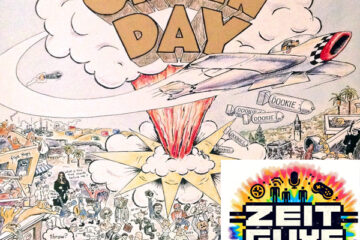“This Land is Your Land” by Woody Guthrie analyzed by Sarah Jordan
Woody Guthrie, a folk singer from Oklahoma, is well known for his patriotic, innovative song “This Land is Your Land.” Guthrie grew up in rough conditions with his sister dying in a fire, and his mother having a mental breakdown causing her to wind up in a mental hospital. His father’s business also failed, so Guthrie and his brother had to survive on their own from a young age. All he had was his guitar, so he began to travel to different locations across the country and string folk tunes. Guthrie ended up learning more and more about politics and began to support socialist ideologies. From the history of his horrendous childhood, the practicality of socialism seemed logical to teenager Guthrie. In simple terms, socialism is everything is owned by the common people, like himself and his brother. Even though Guthrie might have supported socialist ideas, does not mean that the song “This Land is Your Land” is not a patriotic song.
This song shows American patriotism, even though the original song also shows some of America’s true characteristics in a negative way. In 1944, two stanzas were taken out of the original song when released because of the negative tone connected. Guthrie questions if
America is “made for you and me” after seeing “[people standing] there hungry” on the sweet American land. This line is controversial because in the rest of this folk song Guthrie mentions the “golden valley,” “endless skyway,” “Gulf stream waters,” “freedom highway,” “diamond deserts,” and many other beautiful things from and about America. This one line brings out the reality of the working man, and what those who are in the working class go through in day-to-day life, like hunger and homelessness. Guthrie mentions that these types of people, like the impoverished, homeless, hungry, and working class are “[his] people.” Obviously, his childhood has impacted how he views America as a whole. Even though his family was very wealthy, before his father’s company crumbled, in the end, his adolescence was left in shambles with the death of his sister and the breakdown of his mother. Guthrie relates to fighting for his way in the world to be able to support himself in music.
Guthrie has an extraordinary connection and loyalty to the working class, this is why he included the truthful aspect of America’s working class in the original arrangement of “This Land is Your Land.”
This Land is your Land by Grace Novascone
In 1939, “God Bless America” was overplayed, and Guthrie was sick of hearing this song played over and over again on the radio. So, in response to the irritating overplayed song “God Bless America,” Guthrie wrote and filmed a song called “This Land is Your Land” in 1939, which he released in 1940. He thought that Irving Berlin’s song was too gloomy and did not exemplify the whole picture of patriotism, and cut out the challenging life many Americans faced during the Great Depression.
While constructing this song, Guthrie used his experience and knowledge to write this song. He understood first-hand what life was like during this time to be poor. During his childhood years, he hitchhiked back and forth across the country. When he released this song, he used his experience to show how beautiful America’s landscape and nature are while also pointing out how Americans were not feeling blessed at all. The lines “Saw below me the golden valley” and “the sparkling sands of her diamond deserts” are examples of the glorifying language Gutherie uses when describing America and its land.
Once this song was released, it was initially titled “God Blessed America For Me” to retaliate against Berlin’s hit song showing that God was not the solution to America’s problems. However, in 1944, when he debuted this song, he changed the name to “This Land is Your Land” and rewrote the last line of each verse to a friendlier and more patriotic, “This Land was made for you and me.” In short, “This Land is Your Land” is a song that shows unity and inclusion in America.
This Land is Your Land by Dylan Crawford
Folk song “This Land is Your Land” by Woody Guthrie was written for a very interesting reason. When most people are listening to music and come across a song that they don’t like, it’s typical to just skip or mute it. Woody Guthrie wasn’t satisfied with any of these options when it came to “God Bless America” by Irving Berlin and decided he would just write his own song.
The reason for Guthrie’s hatred for this song is because he thought it was overly patriotic and an under-representation of the hardships many Americans were experiencing during the Great Depression.
Guthrie may have believed that “God Bless America” was overly patriotic, but that doesn’t mean he didn’t still have pride for his country. In the very first line, Guthrie claims this land (America) as his own. Throughout the first five stanzas, Guthrie’s lyrics were loaded with positive feelings towards his “land”. These are followed with a stanza which is representing the hardships which he wanted to represent. In this stanza Guthrie speaks to the people struggling, and going hungry and he questions his belonging saying “Is this land made for you and me?”(Guthrie). This may be the most powerful stanza in the song because while the other verses speak to all the great qualities our country holds, verse six has a sense of realism admitting that America has flaws and isn’t always the glorious nation it can be perceived as. Ultimately, Guthrie decides that although this land has faults, it is still his and nobody can ever stop him as he goes “walking that freedom highway”(Guthrie). This last stanza is a perfect finale for the folk song, bringing the full circle to the American lifestyle, speaking out to both good and bad.
This Land is Your Land by Handley Greeley
In 1940, Woody Guthrie released an American classic called, “This Land is Your Land”. When listened to at first, it can be heard as a patriotic song, but when analyzing the lyrics it can be discovered that this song has deeper true themes. Some themes were taken into consideration too much and Woody had to create another version which didn’t include the 5th and 6th version, which was dropped in 1944. The 1944 version came off as a less negative version and more like the American version.
Even though the songs are different, some lyrics contained are the same. In a patriotic way, Woody describes his land as a “golden valley” and “endless skyway”. All throughout the first through fourth stanzas he talks about how his land is “made for you and me”. Then in the fifth and sixth stanza he brings in the negativity. He refers to the great depression when he says “As they stood there hungry…”. Woody then starts to question, “Is this land made for you and me?”. With the great depression being one of America’s lowest points, the people didn’t consider that a patriotic part, so in order for this to be fully positive about your country, Woody removed the fifth and sixth stanza.
Despite the negative stanzas, the song was still overall inspiring. Americans love a march of progress and a story of movement and freedom. What made this song so popular was that it made people proud to be living in their country because it gave them hope. The line “the fog was lifting” is depicting how life will continue to get better after the Great Depression. By declaring that “This land was made for you and me” is displaying manifest destiny, the idea that settlers will continue to expand across North America and make it their own. The idea that “Nobody living can ever stop me” shows the determination and perseverance of Americans to make this land their own.


